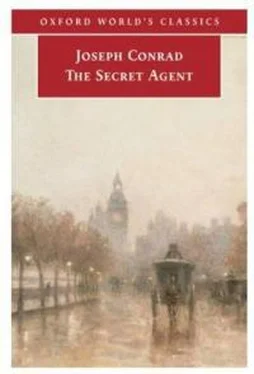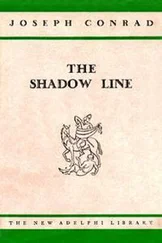Her hands shook so that she failed twice in the task of refastening her veil. Mrs Verloc was no longer a person of leisure and responsibility. She was afraid. The stabbing of Mr Verloc had been only a blow. It had relieved the pent–up agony of shrieks strangled in her throat, of tears dried up in her hot eyes, of the maddening and indignant rage at the atrocious part played by that man, who was less than nothing now, in robbing her of the boy.
It had been an obscurely prompted blow. The blood trickling on the floor off the handle of the knife had turned it into an extremely plain case of murder. Mrs Verloc, who always refrained from looking deep into things, was compelled to look into the very bottom of this thing. She saw there no haunting face, no reproachful shade, no vision of remorse, no sort of ideal conception. She saw there an object. That object was the gallows. Mrs Verloc was afraid of the gallows.
She was terrified of them ideally. Having never set eyes on that last argument of men's justice except in illustrative woodcuts to a certain type of tales, she first saw them erect against a black and stormy background, festooned with chains and human bones, circled about by birds that peck at dead men's eyes. This was frightful enough, but Mrs Verloc, though not a well–informed woman, had a sufficient knowledge of the institutions of her country to know that gallows are no longer erected romantically on the banks of dismal rivers or on wind–swept headlands, but in the yards of jails. There within four high walls, as if into a pit, at dawn of day, the murderer was brought out to be executed, with a horrible quietness and, as the reports in the newspapers always said, "in the presence of the authorities." With her eyes staring on the floor, her nostrils quivering with anguish and shame, she imagined herself all alone amongst a lot of strange gentlemen in silk hats who were calmly proceeding about the business of hanging her by the neck. That—never! Never! And how was it done? The impossibility of imagining the details of such quiet execution added something maddening to her abstract terror. The newspapers never gave any details except one, but that one with some affectation was always there at the end of a meagre report. Mrs Verloc remembered its nature. It came with a cruel burning pain into her head, as if the words "The drop given was fourteen feet" had been scratched on her brain with a hot needle. "The drop given was fourteen feet."
These words affected her physically too. Her throat became convulsed in waves to resist strangulation; and the apprehension of the jerk was so vivid that she seized her head in both hands as if to save it from being torn off her shoulders. "The drop given was fourteen feet." No! that must never be. She could not stand that . The thought of it even was not bearable. She could not stand thinking of it. Therefore Mrs Verloc formed the resolution to go at once and throw herself into the river off one of the bridges.
This time she managed to refasten her veil. With her face as if masked, all black from head to foot except for some flowers in her hat, she looked up mechanically at the clock. She thought it must have stopped. She could not believe that only two minutes had passed since she had looked at it last. Of course not. It had been stopped all the time. As a matter of fact, only three minutes had elapsed from the moment she had drawn the first deep, easy breath after the blow, to this moment when Mrs Verloc formed the resolution to drown herself in the Thames. But Mrs Verloc could not believe that. She seemed to have heard or read that clocks and watches always stopped at the moment of murder for the undoing of the murderer. She did not care. "To the bridge—and over I go." …But her movements were slow.
She dragged herself painfully across the shop, and had to hold on to the handle of the door before she found the necessary fortitude to open it. The street frightened her, since it led either to the gallows or to the river. She floundered over the doorstep head forward, arms thrown out, like a person falling over the parapet of a bridge. This entrance into the open air had a foretaste of drowning; a slimy dampness enveloped her, entered her nostrils, clung to her hair. It was not actually raining, but each gas lamp had a rusty little halo of mist. The van and horses were gone, and in the black street the curtained window of the carters' eating–house made a square patch of soiled blood–red light glowing faintly very near the level of the pavement. Mrs Verloc, dragging herself slowly towards it, thought that she was a very friendless woman. It was true. It was so true that, in a sudden longing to see some friendly face, she could think of no one else but of Mrs Neale, the charwoman. She had no acquaintances of her own. Nobody would miss her in a social way. It must not be imagined that the Widow Verloc had forgotten her mother. This was not so. Winnie had been a good daughter because she had been a devoted sister. Her mother had always leaned on her for support. No consolation or advice could be expected there. Now that Stevie was dead the bond seemed to be broken. She could not face the old woman with the horrible tale. Moreover, it was too far. The river was her present destination. Mrs Verloc tried to forget her mother.
Each step cost her an effort of will which seemed the last possible. Mrs Verloc had dragged herself past the red glow of the eating–house window. "To the bridge—and over I go," she repeated to herself with fierce obstinacy. She put out her hand just in time to steady herself against a lamp–post. "I'll never get there before morning," she thought. The fear of death paralysed her efforts to escape the gallows. It seemed to her she had been staggering in that street for hours. "I'll never get there," she thought. "They'll find me knocking about the streets. It's too far." She held on, panting under her black veil.
"The drop given was fourteen feet."
She pushed the lamp–post away from her violently, and found herself walking. But another wave of faintness overtook her like a great sea, washing away her heart clean out of her breast. "I will never get there," she muttered, suddenly arrested, swaying lightly where she stood. "Never."
And perceiving the utter impossibility of walking as far as the nearest bridge, Mrs Verloc thought of a flight abroad.
It came to her suddenly. Murderers escaped. They escaped abroad. Spain or California. Mere names. The vast world created for the glory of man was only a vast blank to Mrs Verloc. She did not know which way to turn. Murderers had friends, relations, helpers—they had knowledge. She had nothing. She was the most lonely of murderers that ever struck a mortal blow. She was alone in London: and the whole town of marvels and mud, with its maze of streets and its mass of lights, was sunk in a hopeless night, rested at the bottom of a black abyss from which no unaided woman could hope to scramble out.
She swayed forward, and made a fresh start blindly, with an awful dread of falling down; but at the end of a few steps, unexpectedly, she found a sensation of support, of security. Raising her head, she saw a man's face peering closely at her veil. Comrade Ossipon was not afraid of strange women, and no feeling of false delicacy could prevent him from striking an acquaintance with a woman apparently very much intoxicated. Comrade Ossipon was interested in women. He held up this one between his two large palms, peering at her in a business–like way till he heard her say faintly "Mr Ossipon!" and then he very nearly let her drop to the ground.
"Mrs Verloc!" he exclaimed. "You here!"
It seemed impossible to him that she should have been drinking. But one never knows. He did not go into that question, but attentive not to discourage kind fate surrendering to him the widow of Comrade Verloc, he tried to draw her to his breast. To his astonishment she came quite easily, and even rested on his arm for a moment before she attempted to disengage herself. Comrade Ossipon would not be brusque with kind fate. He withdrew his arm in a natural way.
Читать дальше












